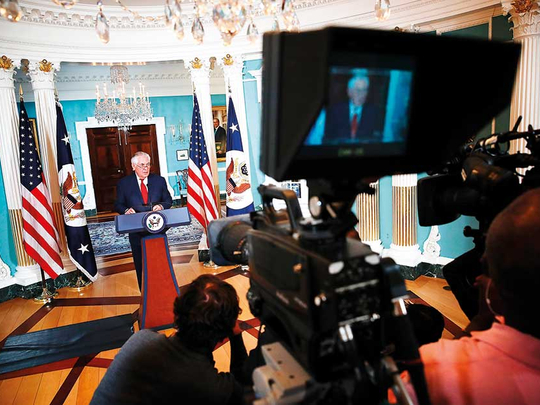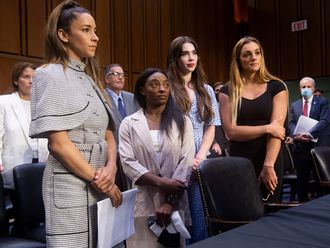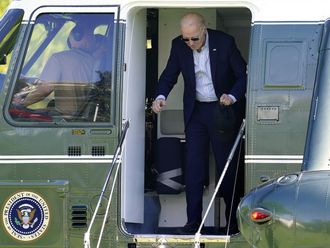
Washington: US Secretary of State Rex Tillerson has declared he never considered resigning as President Donald Trump’s top diplomat, disputing what he called “erroneous” reports that he wanted to step down earlier this year. After pointedly refusing to answer whether he once called the president a “moron”, Tillerson had a spokeswoman deny he used such language.
Thrust into the spotlight under uncomfortable circumstances, the normally camera-shy Tillerson sought to rebut a widely disseminated NBC News story that claimed Vice-President Mike Pence had to talk the former oil man out of resigning over the summer, and that Tillerson had questioned Trump’s intelligence. The explosive claims followed several instances in which Trump’s and Tillerson’s policy pronouncements have appeared to clash.
“There has never been a consideration in my mind to leave,” Tillerson told reporters Wednesday in an unusually personal address from the State Department’s staid 7th-floor Treaty Room outside of his office.
From Las Vegas, where he travelled to meet with medical personnel and others affected by the mass shooting there, Trump told reporters he has “total confidence” in Tillerson. Earlier, Trump denounced the report as “fake news” on Twitter.
While praising Trump’s foreign policy on Wednesday, Tillerson raised eyebrows by pointedly declining to deny he had called the president a “moron” after a contentious meeting at the Pentagon in July.
“I’m not going to deal with petty stuff like that,” the former Exxon Mobil CEO said. “I mean, this is what I don’t understand about Washington. Again, I’m not from this place, but the places I come from, we don’t deal with that kind of petty nonsense.”
“Let me tell you what I’ve learnt about this president, whom I did not know before taking this office,” Tillerson said. “He loves his country. He puts Americans and America first. He’s smart. He demands results wherever he goes, and he holds those around him accountable for whether they’ve done the job he’s asked them to do.”
Later, State Department spokeswoman Heather Nauert flatly denied that Tillerson called Trump a moron. She said Tillerson hasn’t said sorry to Trump, as no apology was needed.
Pence backed up Tillerson’s account by saying the two men never discussed the “prospect of the secretary’s resignation from the administration.”
“Any reporting to the contrary is categorically false,” Pence’s statement said.
NBC said Tillerson had been on the verge of resigning this summer amid mounting policy disputes with the White House. It said the tensions came to a head around the time Trump gave a politicised speech in July to the Boy Scouts of America, an organisation Tillerson once led. The network claimed Pence and Mattis convinced Tillerson to stay.
A person familiar with the conversation also disputed that the vice president sought to coax the secretary of state into not quitting. The discussion instead focused on easing tensions between Tillerson and the White House and finding a way for him to operate better within the Cabinet, said the individual, who wasn’t authorised to speak publicly on the private discussion and demanded anonymity.
Trump himself pounced on the NBC report, before and after Tillerson offered his side of the story.
“The @NBCNews story has just been totally refuted by Sec. Tillerson and @VP Pence. It is #FakeNews. They should issue an apology to AMERICA!” Trump tweeted.
NBC stood by its reporting.
Tillerson’s move on Wednesday to reassure Trump of his convictions may well be too little and too late for the long term, according to the accounts of 19 current and former senior administration officials and Capitol Hill aides, most of whom spoke on the condition of anonymity to offer candid assessments.
The already tense relationship between the two headstrong men — one a billionaire former real estate developer, the other a former captain of the global oil industry — has ruptured into what some White House officials call an irreparable breach that will inevitably lead to Tillerson’s departure, whether immediately or not. Tillerson’s dwindling cohort of allies say he has been given an impossible job and is doing his best with it.
For months now, Trump has been piqued by rumours of disloyalty that have filtered up to him from the State Department. In private meetings, the president has also been irked by Tillerson’s arguments for a more traditional approach on policies, from Iran to climate change to North Korea, and his visible frustration when overruled. Trump has chafed at what he sees as arrogance on the part of an employee.
And as Tillerson has travelled the globe, Trump believes his top diplomat often seems more concerned with what the world thinks of the United States than with tending to the president’s personal image.
Meanwhile, Tillerson — who ran the world’s largest corporation with near-dictatorial control — has struggled to submit to the whims and wishes of a boss who governs by impulse. Deliberative in style, he has been caught off guard by Trump’s fiery and injudicious tweets and repulsed by some flashes of the president’s character, such as when Trump said there were “fine people” among those marching at a deadly white supremacist rally in Charlottesville, Virginia. “The president speaks for himself,” Tillerson said at the time.
Tillerson has also been uncomfortable with the chain of command in the West Wing, sometimes “table dropping” his proposals in meetings — springing PowerPoint slides on his national security colleagues without advance notice.
“He, from my perspective, is in an incredibly frustrating place,” Sen. Bob Corker, R-Tenn., said of Tillerson on Wednesday, calling him one of several administration officials “separating our country from chaos.”
“He ends up not being supported in a way that I would hope a secretary of state would be supported,” Corker said.
Two career businessmen with different world views and management styles, Trump, 71, and Tillerson, 65, came together in something of an arranged marriage last December. Each has been exasperated at the way the other has handled his job, current and former officials said.
But tensions have escalated badly over the past few weeks as Tillerson and his small circle of aides clashed with White House officials over matters as big as the direction of US policy in Afghanistan and as small as Tillerson’s habit, according to White House officials, of neglecting to return phone calls.
Tillerson’s public remarks Wednesday came after months of disagreements between Tillerson and the White House over staffing and administrative matters at the State Department and a disconnection over what Trump saw as Tillerson’s conventional approach to policy matters.
Over the weekend, Trump contradicted Tillerson on diplomatic relations with North Korea and its leader. Trump tweeted that the secretary of state was “wasting his time trying to negotiate with Little Rocket Man” — his nickname for North Korea’s Kim Jong Un.
Tillerson has repeatedly ended up on the losing side of important policy discussions, and people familiar with White House views say Trump resents him for the debates he has won, including a grudging decision last month to add US forces to the inconclusive 16-year war in Afghanistan.
“Rex Tillerson has been dealt a bad hand by the Potus & has played it badly. For both reasons he cannot be effective SecState & should resign,” Council on Foreign Relations president Richard Haass wrote on Twitter ahead of Tillerson’s statement Wednesday.
Haass, a former top State Department official, declined an interview request but also wrote that it would be hard for anyone to do the job well. He cited a Trump policy agenda that includes separating the United States from trade deals such as the Trans-Pacific Partnership and international compacts such as the Paris climate accord, Trump’s Twitter habit, plus a lack of staff and money.
“The White House thinking is unequivocal that he’s going to be gone soon, but the assumption is that he’s going to quit on his own so Trump can say, ‘Thank you for your year of service,’” said a former senior official who has held recent meetings at the White House.
Tillerson entered office as one of the mainstream foreign policy and national security voices around Trump, putting him at odds with Trump’s first national security adviser, Michael Flynn, and his former chief strategist, Stephen K. Bannon. He also held an uncertain balance of power with Trump’s son-in-law and adviser Jared Kushner, whom Trump tasked with seeking Middle East peace and describes as a key foreign policy adviser.
Tillerson has complained about the fuzzy lines of authority and about being cut out of some decisions involving Kushner, two people familiar with his thinking said. Kushner has told others in the administration that Tillerson is too dismissive of colleagues.
Trump himself has groused that Tillerson isn’t supportive enough during national security meetings, speaking little and sometimes in clipped tones.
Tillerson clashed with other Trump advisers over the administration’s approach to the Iran nuclear deal, and whether Trump should certify to Congress next month that the landmark agreement is in the US national interest.
Tillerson has argued internally that it is, despite what he calls serious flaws in the deal, and Defense Secretary Jim Mattis went public Tuesday with the same argument. But Trump has strongly suggested he will go the other way, and has bristled at being “steered” toward what he views as an inauthentic position, several people familiar with the dispute said.
Tillerson would not say Wednesday whether he agrees with Mattis, whose own position within the administration appears more solid.
In this case and others where they have disagreed, Tillerson advocated what Trump has complained is a “totally conventional” position that is at odds with Trump’s break-the-mold philosophy. Trump, for example, was incensed last weekend when he thought Tillerson was “freelancing” a diplomatic overture to North Korea, one official said.
Trump has said he believes talking to North Korea has failed for three decades and he sees no reason it would work now.
“His is the traditional, establishment model,” one person who has discussed Tillerson’s views with Trump said. “It’s the same foreign policy that John Kerry had and it’s the same foreign policy that Hillary Clinton had. It is not America leading. It is America trying to be cordial and collegial with everybody.”
On Wednesday, Tillerson praised the foreign policy model that Trump espouses and that Tillerson has argued against in a series of internal debates. Trump’s national security team is united in “doing great things for the United States of America to make America great again,” Tillerson said, echoing Trump’s campaign theme.
“He loves his country,” he said. “He puts Americans and America first. He’s smart. He demands results wherever he goes and he holds those around him accountable.”
Trump responded favourably. “I was very honoured by his comments,” he told reporters during a visit to Las Vegas. “Total confidence in Rex, I have total confidence.”
The White House and State Department both denied the NBC report that Tillerson had insulted Trump after a national security meeting at the Pentagon over the summer by calling him a “moron.” But West Wing aides said the rumour of such a remark had floated in the halls before the NBC story Wednesday.
Tillerson declined to directly address the name-calling detail, calling it “petty” and an example of Washington backbiting that is foreign to him. But his spokeswoman, Heather Nauert, said later in the day that Tillerson had explicitly denied it in a conversation with her.
“The secretary did not use that type of language to speak about president of the United States,” she said. “The secretary does not use that language to speak about anyone. He did not say that.”
Tillerson and his aides first found themselves at odds with some Trump aides months ago, when the chief diplomat launched a management overhaul at State that is projected to take years, to the annoyance of some senior White House officials eager to fill jobs. Tillerson, in turn, was annoyed by what he saw as continued chaos and ineptitude in the administration that continued for months, people familiar with his thinking said.
He also complained to friends about competing power centers and a culture of back-stabbing within the Trump administration that is very different from the top-down corporate culture he left. That same corporate experience gave Tillerson a background in the sensitivities and demands of a large and diverse workforce, and appeared to inform his clear disagreement with Trump over Charlottesville.
Vice President Mike Pence at one point tried to help ease tensions, counselling Tillerson that he should take up any concerns he has directly with the president in private, rather than airing his grievances publicly, a White House official said.
But Pence was described as “very annoyed” Wednesday after a State Department spokesman, R.C. Hammond, claimed in the NBC story that Pence had urged Tillerson not to resign and had asked Tillerson if UN ambassador Nikki Haley was a problem for the administration. The vice president’s office put out a statement Wednesday denying those parts of the story, while Hammond took to Twitter to apologise, writing, “I spoke out of line about conversations I wasn’t privy to.”
Nauert said Tillerson “never considered resigning from his post and for those who want him to do so, go ahead and keep pushing because that will only strengthen his resolve,” to stay.
Still, Tillerson’s tenure remains decidedly uncertain, and many in the West Wing and in Congress suggested Wednesday that a “Rexit” was still likely to happen by early 2018.
Tillerson also remains isolated in political Washington, with few confidants aside from Corker on Capitol Hill. He has met only twice with Sen. John McCain, R-Ariz., the chairman of the Armed Services Committee and his party’s leading voice on national security. One of those meetings was before Tillerson’s Senate confirmation.
“Tillerson has no help. No team, no natural allies and he’s not hiring anyone,” one former senior official said. “There’s a kind of death spiral.”












